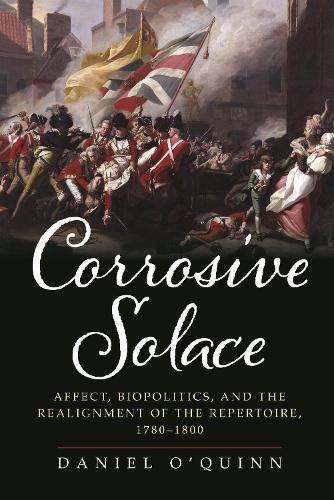Full Product Details
Author: Daniel O'Quinn
Publisher: University of Pennsylvania Press
Imprint: University of Pennsylvania Press
ISBN: 9781512823110
ISBN 10: 1512823112
Pages: 376
Publication Date: 11 October 2022
Audience:
Professional and scholarly
,
Professional & Vocational
Format: Hardback
Publisher's Status: Active
Availability: To order

Stock availability from the supplier is unknown. We will order it for you and ship this item to you once it is received by us.
Reviews
Corrosive Solace represents an authoritative statement on the importance of the theatre to what Daniel O'Quinn characterizes as the 'post-American condition,' i.e., how society, politics, and culture in Britain dealt with the loss of the American colonies and within a few short years, a new imperial dispensation, looking toward India and the threat of Napoleon in Europe. The book traces in fine detail 'what it feels like' to experience the pressure of historical change without being able to articulate or fully encompass what that change means. It is thoroughly and admirably interdisciplinary, seamlessly integrating approaches from theatre history, performance studies, cultural studies, affect theory, and social and political history to produce concentrated but still lucid readings of a number of key texts, performers, and events. Together these readings make for a new history of the 1780s and 1790s, especially in relation to the history of the broader politico-cultural role of the patent theatres, that will radically alter how we view these crucial decades. * -Gillian Russell, University of York *
"""The significance of O’Quinn’s argument is its ability to link the everyday and the personal with the social, the political, and the cultural. At the level of both form and content, O’Quinn attempts to understand the implications and potentialities of affective recognitions, aesthetic mediations, formal transformations, and generic innovations in all their urgency and topicality, as a response to a cultural need to adapt to a period of turbulent transition instigated by historical crises. The argument progresses from issues of embodiment to questions of consciousness to transformations in processes of socialization to explain the emergence of systemic norms. It effectively reconciles phenomenological investigations with structuralist manifestations, offering a forensic cultural analysis of affect and affective sociability. "" * Studies in Romaticism * ""Corrosive Solace represents an authoritative statement on the importance of the theatre to what Daniel O’Quinn characterizes as the ‘post-American condition,’ i.e., how society, politics, and culture in Britain dealt with the loss of the American colonies and within a few short years, a new imperial dispensation, looking toward India and the threat of Napoleon in Europe. The book traces in fine detail ‘what it feels like’ to experience the pressure of historical change without being able to articulate or fully encompass what that change means. It is thoroughly and admirably interdisciplinary, seamlessly integrating approaches from theatre history, performance studies, cultural studies, affect theory, and social and political history to produce concentrated but still lucid readings of a number of key texts, performers, and events. Together these readings make for a new history of the 1780s and 1790s, especially in relation to the history of the broader politico-cultural role of the patent theatres, that will radically alter how we view these crucial decades."" * —Gillian Russell, University of York *"
Corrosive Solace represents an authoritative statement on the importance of the theatre to what Daniel O’Quinn characterizes as the ‘post-American condition,’ i.e., how society, politics, and culture in Britain dealt with the loss of the American colonies and within a few short years, a new imperial dispensation, looking toward India and the threat of Napoleon in Europe. The book traces in fine detail ‘what it feels like’ to experience the pressure of historical change without being able to articulate or fully encompass what that change means. It is thoroughly and admirably interdisciplinary, seamlessly integrating approaches from theatre history, performance studies, cultural studies, affect theory, and social and political history to produce concentrated but still lucid readings of a number of key texts, performers, and events. Together these readings make for a new history of the 1780s and 1790s, especially in relation to the history of the broader politico-cultural role of the patent theatres, that will radically alter how we view these crucial decades. * —Gillian Russell, University of York *
Author Information
Daniel O'Quinn is Professor of the School of English and Theatre Studies at the University of Guelph. He is author of Engaging the Ottoman Empire: Vexed Mediations, 1690–1815, also available from the University of Pennsylvania Press.



